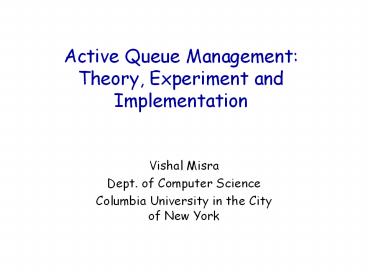Active Queue Management: Theory, Experiment and Implementation - PowerPoint PPT Presentation
1 / 32
Title:
Active Queue Management: Theory, Experiment and Implementation
Description:
Hardware Implementation. Active collaboration with two vendors on implementing ... Hardware designers unwilling to allot memory real estate for AQM (relatively ... – PowerPoint PPT presentation
Number of Views:87
Avg rating:3.0/5.0
Title: Active Queue Management: Theory, Experiment and Implementation
1
Active Queue Management Theory, Experiment and
Implementation
- Vishal Misra
- Dept. of Computer Science
- Columbia University in the City of New York
2
Collaborators
- C.V. Hollot, Don Towsley UMass Amherst
- Victor Firoiu Nortel Networks
- Kevin Jeffay, Nguyen-Long Le, Don Smith UNC
Chapel Hill
3
Outline
- Investigating rate based control
- Implementation of PI controller
- Hardware
- Software
- Experiment
- Performance evaluation under generated web traffic
4
MGT Fluid-Flow Model
q
W
TCP dynamic
queue dynamic
p
AQM
time delay R secs
oscillatory behavior increases with increasing
round-trip time
5
Kelly
W
x
TCP dynamic
p
AQM
time delay R secs
oscillatory behavior decreases with increasing
round-trip time
6
Paradox?
- MGT model control based on queue length (q)
- Kelly model control based on arrival rate (x)
Rate Feedback p g(x)
7
Utilization with different B
8
Rate Feedback p g(x)
linearization
d x
d W
-
d p(t - R)
d p
time delay R secs
9
L(s)
-
rate feedback loop
d p
d p(t - R)
where W0 satisfies
()
10
Stability (B1)
N60 flows C3750 packets/sec
unstable for ? gt 0.3
Stability ? distance of Nyquist plot from 1j0
11
unstable for ? gt 0.3
Simulations at RTT 300 ms
N60 flows C3750 packets/sec
12
Parabolic rate feedback B 2
Where, W0 satisfies
13
Multiple Equilibria (Throughput)
14
Multiple Equilibria (Stability)
15
Stability (B2)
N60 flows C3750 packets/sec
unstable for ? gt 0.8
16
Simulations at RTT 300 ms
N60 flows C3750 packets/sec
17
Implementation and Experiments
18
Implementing PI controller
PI
p(t)
q(t)
qref
Integral controller, regulates router buffer to
some operator controlled value qref
19
Hardware Implementation
- Active collaboration with two vendors on
implementing PI on a router - Nortel Networks Next generation edge router
- Cisco IOS on the 3260 platform
20
Transitioning from theory to practice (Nortel)
- Theory, Simulations Worry about computations at
one output queue, for a single class of traffic - Practice Typical router has M ( 512) queues, E
( 8) classes
21
Speed Issues
- Consider a 10 GBps router, 1000 byte average
packet size - Theory Sampling interval (say) 1 ms
computational overhead spread over 40000 packets
lightweight computations - Practice Sampling interval 1ms, MxE (512x8)
computations spread over 10 packets significant
overhead!
22
Memory issues
- Theory One drop/marking probability needs to be
maintained - Practice MxE values have to be maintained!
- Hardware designers unwilling to allot memory real
estate for AQM (relatively small part of a
router) - Solution Discretize 0,1 and use small
precomputed tables
23
Architecture
Small (8) number of tables used with finite (
16) entries
24
Open research issues
- How do you discretize 0,1 ?
- Linear is clearly not the answer operating
region typical below 0.2 - Given a typical operating range of p what
performance metric do we optimize? What is the
cost function?
25
Software Implementation of PI
Study of AQM at UNC
- Tuning RED for Web Traffic, Sigcomm 2000
- Implemented RED on a software router (the ALTQ
system running on FREEBSD) - Compared performance of RED and FIFO (Droptail)
on a testbed with generated Web traffic studied
request completion latency - Conclusions RED normally does not help,
difficult to tune for scenarios when it can help - (read RED only possibly helps in really extreme
cases and even here it's hard as hell to get the
settings right)
AQM bad idea?
26
Handwaving explanation
FIFO
More losses, more retransmissions, more
timeouts..-gt higher latency!
27
UNC Testbed
28
PI Implementation on ALTQ
- PI added as a module to ALTQ at UNC
- Issues no floating point arithmetic allowed,
need to be careful about saturation, integer
overflows! - Sigcomm 2000 experiments repeated under (nearly)
identical conditions with PI as third mechanism - PI tuned using formula given in Infocom 2000 paper
29
Plot of CDF of response time of requests (80
load)
Cumulative probability
Response time (ms)
30
Plot of CDF of response time of requests (100
load)
FIFO, RED
PI, qref20
Cumulative probability
PI, qref200
Response time (ms)
31
Plot of CDF of response time of requests (110
load)
FIFO, RED
PI, qref20
Cumulative probability
PI, qref200
Response time (ms)
32
Preliminary conclusions
- AQM may not be bad after all PI/20 performs
significantly better for short objects under
heavy load - Experiments run with packet dropping, not ECN
- ECN experiments planned performance should
improve dramatically over FIFO































